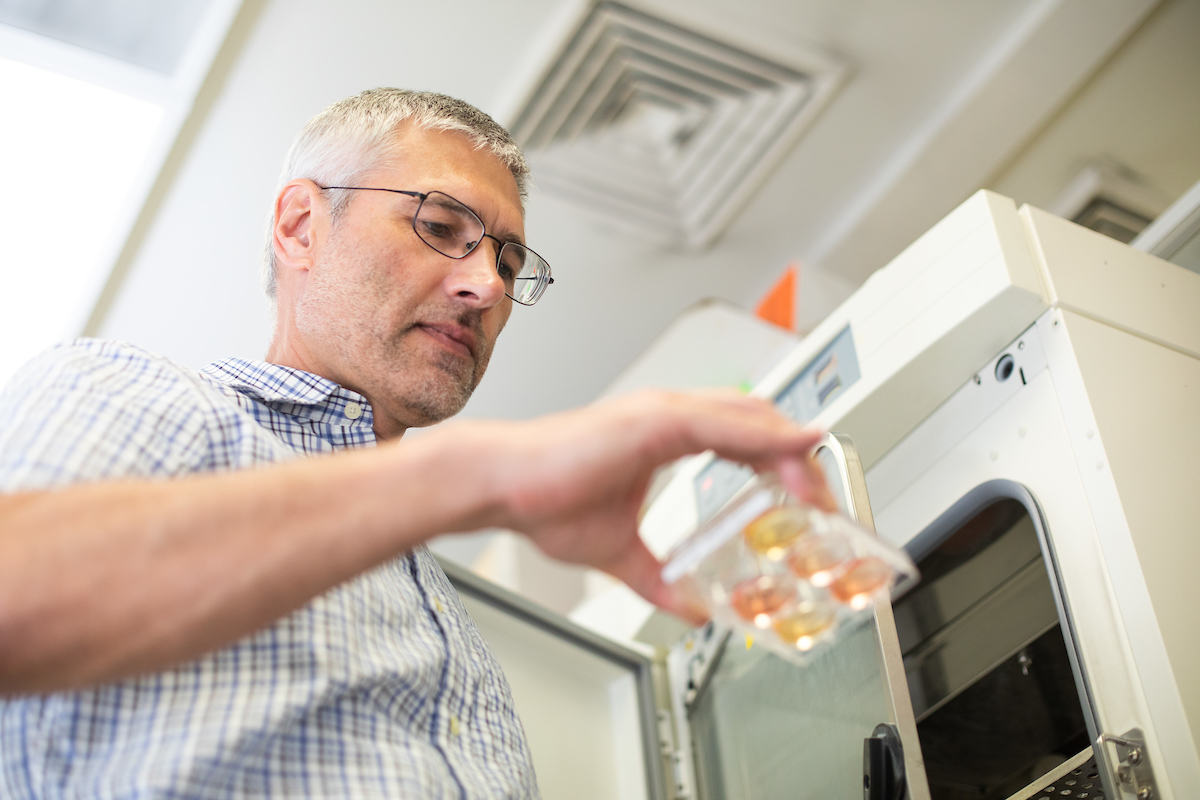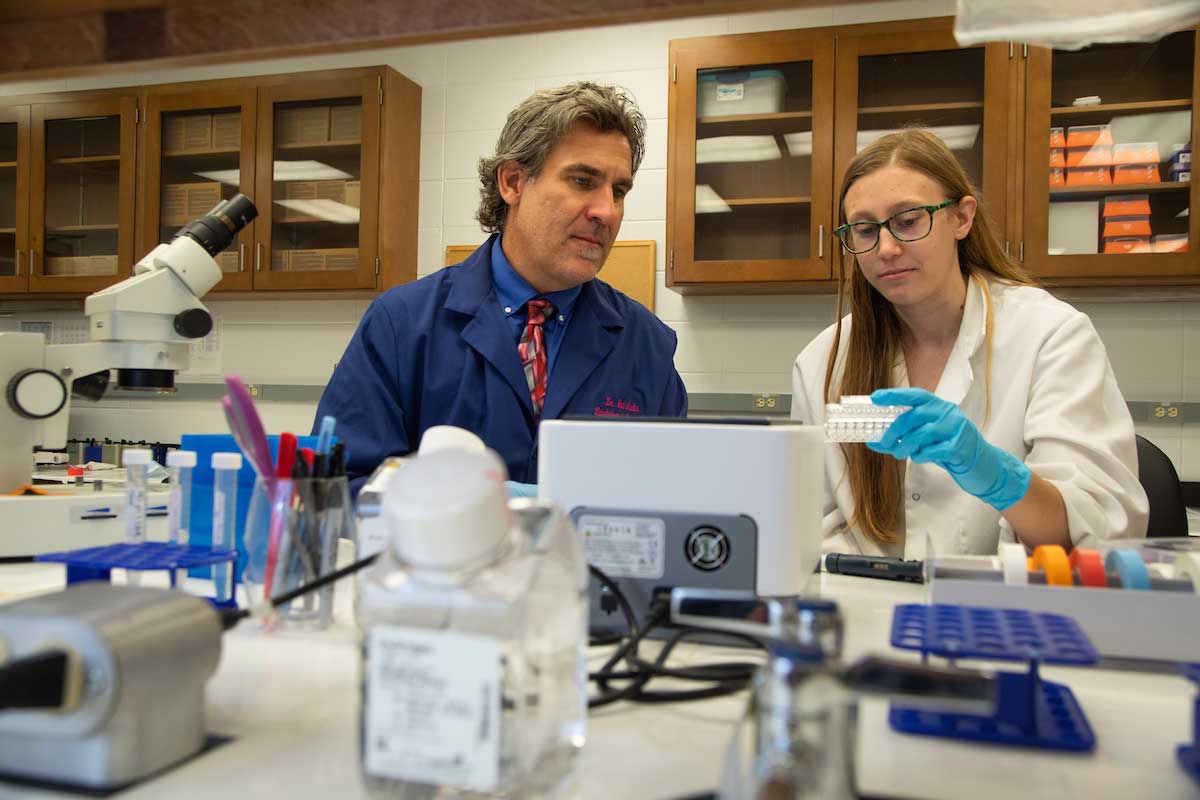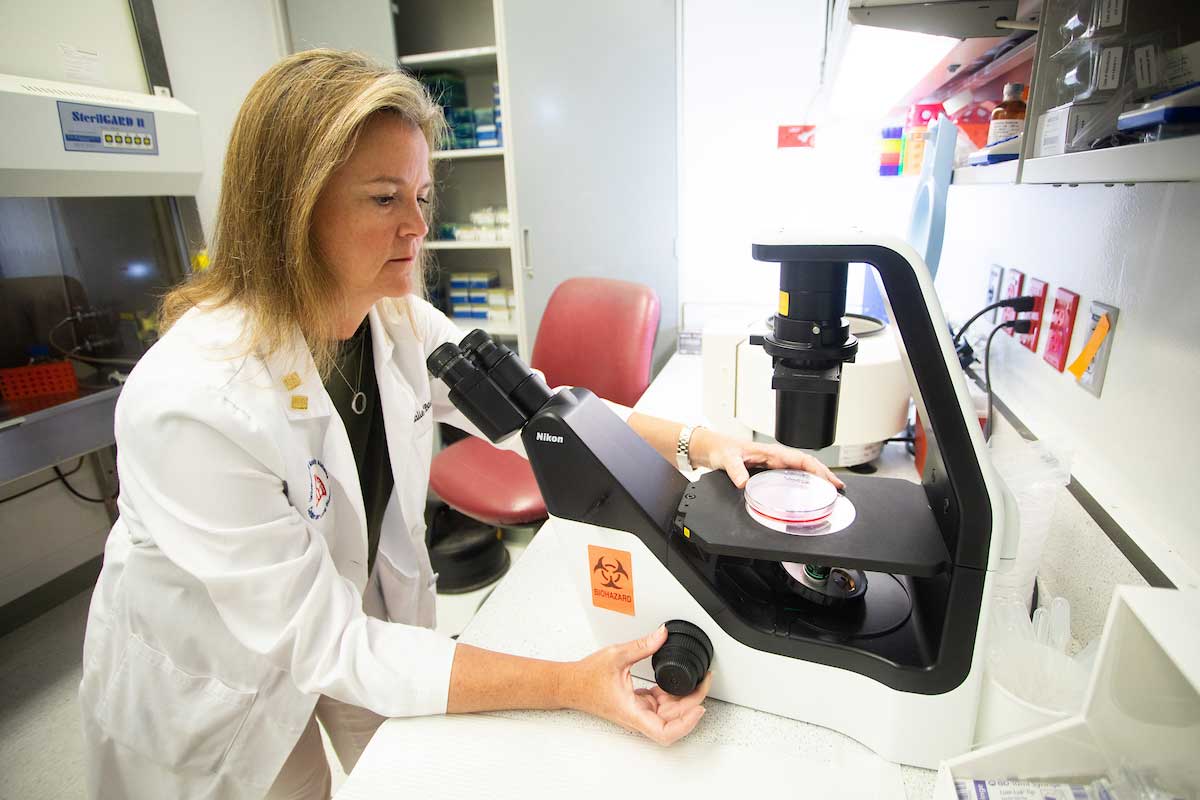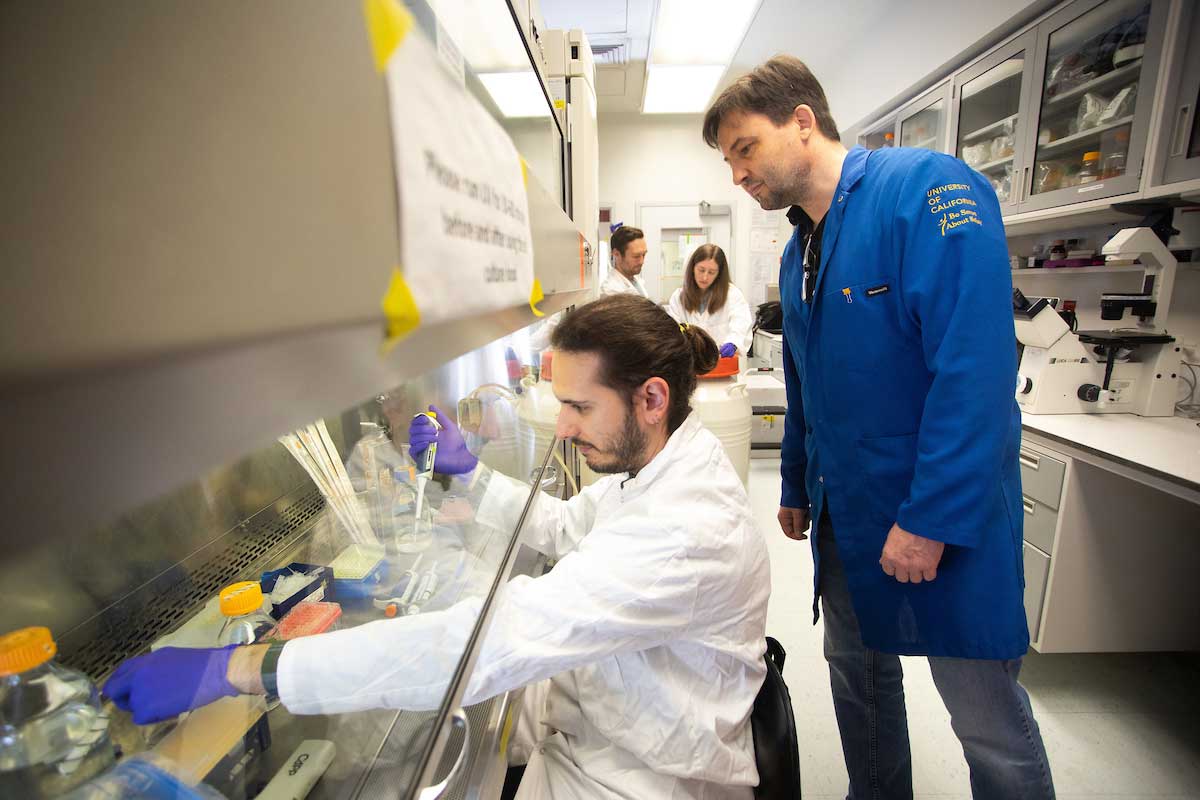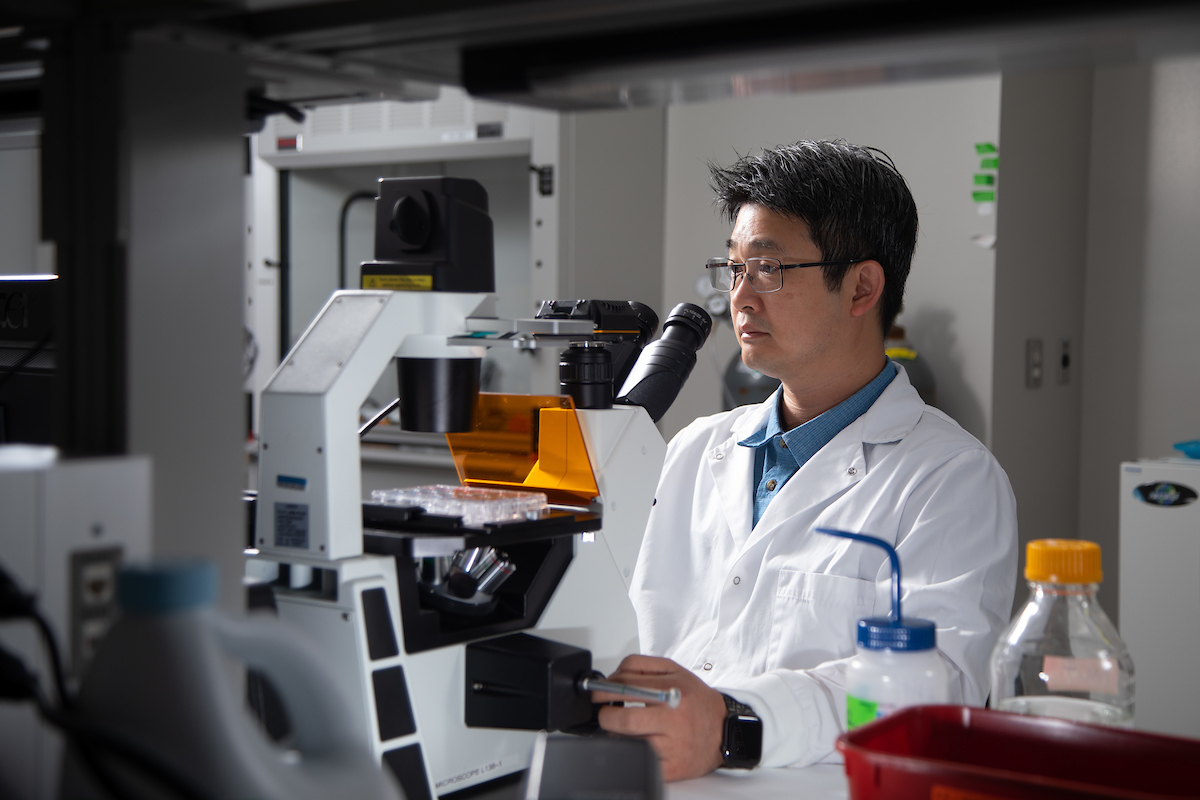Intramural Grants Program
Purpose
The Frederick P. Whiddon College of Medicine provides funds for basic, clinical and
translational research
through an annual competitive Intramural Grants Program (IGP). Two tracks are offered:
Seed funding: This will provide funds for projects that are conceptually new, have not been supported from any other funding sources (excluding start-up funds), and have a clear potential to be competitive for extramural grants support.
Funding to support revised grant submissions: This provides funds to allow investigators to obtain preliminary data required to increase the competitiveness of revised grant applications. To qualify for these funds, an application based on the project must have been submitted to an external funding agency within the last 18 months. For both tracks, collaborative proposals are encouraged. Clinical trials will not be supported.
Award Year: 2023-2024
Rob Barrington, PhD, Dept. of Microbiology & Immunology
Trained Immunity as a therapeutic approach for Hyper-IgE Syndrome
Kalsang Dolma, MD, Dept. of Pediatrics, Neonatology
Role of Cytopathic Tau Variants in the development of Bronchopulmonary Dysplasia
Mark Swingle, PhD, Dept. of Biochemistry & Molecular Biology
Potential regulation of PPM1B by carbon dioxide
Marie Migaud, PhD, Dept. of Pharmacology
Synthesis of non-canonical 2’-deoxynucleotides to reveal new pathways to genomic interference
Award Year: 2023
Luis del Pozo-Yauner, Ph.D.
Role of Polyploid Giant Cancer Cells in Resistance to Therapy and Tumor Recurrence
in High-grade Serous Ovarian Carcinoma
Awarded $50,000
Jin Kim, Ph.D.
Combinational therapy for Influenza A infection in mice to extend the treatment window
Awarded $50,000
Wito Richter, Ph.D.
Targeting cAMP signaling and PDE4 in metabolic syndromes
Awarded $50,000
Award Period: 04/01/22-03/31/23
1. Natalie Bauer, Ph.D.
Extracellular Vesicle Signaling in the Pulmonary Circulation
Award Amount: $25,000
2. Victor Solodushko, Ph.D.
Testing the efficacy of a novel easily modifiable replication-deficient influenza A
Award Amount: $50,000
Award Period: 11/1/21-10/31/22
1. Jonathan Audia, Ph.D.
Request for an Additional Year of Bridge Funding Support
Award Amount: $25,000
2. Jin Hyun Kim, DVM, Ph.D.
Identification of highly selective packaging signal sequences of influenza A virus
for developing drug-resistance free therapeutics
Award Amount: $50,000
3. Wito Richter, Ph.D.
Targeting cAMP signaling and PDE4 in metabolic syndromes
Award Amount: $50,000
Award Period: 11/1/20-10/31/21
1. Casey Daniel, Ph.D.
A longitudinal study of COVID-19 sequelae and health disparities
Award Amount: $49,901
2. Jonathan Audia, Ph.D.
Bridge funding for R01 HL118334 entitled Caspase-1, the microvascular endothelium, and infection
Award Amount: $50,000
3. Glen Borchert, Ph.D.
Salmonella sRNAs drive the decision between active stress resistance and persister cell dormancy
Award Amount: $44,961
4. Natalie Gassman, Ph.D.
Inhibition of caspase-1 as a cardioprotective strategy during doxorubicin treatment
Award Amount: $50,000
5. Sarah Sayner, Ph.D.
Role of AC10 in gender disparities associated with ARDS
Award Amount: $50,000
Award Period: 11/1/19-10/31/20
1. Robert Barrington, Ph.D.
Defining immunologic heterogeneity as a means to biomarker identification and precision medicine for PAP
Award Amount: $49,730
2. Natalie Bauer, Ph.D.
Mechanisms of Extracellular Vesicle Signaling
Award Amount: $50,000
3. Steve Lim, Ph.D.
Nuclear FAK regulation of VSMC phenotypic switching in atherosclerosis
Award Amount: $50,000
4. Jon Simmons, Ph.D.
Establishment of a porcine model of hemorrhagic shock at the University of South Alabama
Award Amount: $50,000
5. Xiangming Zha, Ph.D.
Functional importance of GPR4 in brain microvascular endothelial cell
Award Amount: $50,000
Award period: 3/1/19-2/29/20
1. Erin Ahn, Ph.D.
Targeting SON-mediated RNA splicing in glioblastoma
Award Amount: $50,000
2. Donna Cioffi, Ph.D.
Effects of IgG glycosylation on endothelial barrier function
Award Amount: $50,000
3. Annabelle Fonseca, Ph.D.
Quantitative imaging analysis of pancreatic cysts
Award Amount: $25,000
4. Brian Fouty, Ph.D.
Quantitative imaging analysis of pancreatic cysts
Award Amount: $50,000
Award period: 11/1/18-10/31/19
1. Lyudmila Rachek, Ph.D.
Effect of bariatric surgery on mtDNA DAMPs, inflammation and diabetes outcome
Award Amount: $50,000
2. Mykhaylo Ruchko, Ph.D.
Role of circulating mtDNA fragments in the development of insulin resistance and heart failure
Award Amount: $50,000
Award period: 11/1/17-10/31/18
1. Robert Barrington, Ph.D.
Underlying mechanisms mediating autoimmune pulmonary alveolar proteinosis
Award Amount: $48,019
2. Donna Cioffi, Ph.D.
Regulation of endothelial store-operated calcium entry by an FKBP51/PP5C axis
Award Amount: $50,000
3. Lawrence LeClaire, Ph.D.
Actin-associated proteins of the Aspergillus cytoskeleton
Award Amount: $46,850
4. Mike Lin, Ph.D.
Pulmonary endothelium-derived amyloid proteins impair neural function
Award Amount: $50,000
5. Mark Taylor, Ph.D.
Role of toxic host factors in endothelial dysfunction during Vibrio vulnificus sepsis
Award Amount: $50,000
Eligible Applicants
Applicants must be full-time faculty (Assistant Professor or above) with primary appointments
in the COM. Co-investigators may be from any unit or college. The following faculty
are not eligible:
•Faculty with startup or other institutional funds currently available to them, with
balances
greater than $100,000
•Faculty in their terminal appointment year
•Emeritus faculty
Key Dates (2024-2025 IGP)
Submission deadline - Friday, October 18, 2024 @ 5:00p.m.
Awards are anticipated to commence in December 2024
Program Budget
The COM commits $250,000 annually to this program, providing individual one-year awards
in the range of $25,000-50,000 in direct costs. The amount of each award and the number
of awards made will be contingent upon the number of meritorious
proposals submitted, the scope of work therein, and proposal budgets.
Application Content
The submission packet must include:
1) Cover page and Intramural Transmittal Form signed by the PI, any faculty collaborators, and relevant chairs.
2) Research Plan (in NIH format) comprising:
A. Abstract (150 words max. on a separate page)
B. Specific Aims Page
C. Significance
D. Innovation
E. Approach ((describing a one-year work plan))
F. A paragraph explaining how the proposed project will be leveraged to attract extramural
funding, including targeted funding agencies.
G. If applicable, specialized facilities or resources needed for the project beyond
what is typically available to COM investigators, e.g. use of outside fee-for-service
labs, high performance computing.
H. References Cited
A maximum of one page is allowed for the Specific Aims and a maximum of four pages for sections C-F.
3) NIH Biosketches – for the PI and any faculty collaborators, including other support for the past
3 years
4) Detailed NIH-style Budget and Budget Justification.
Non-allowable costs – faculty salary; extramural subcontracts.
Allowable costs – other budget items allowed under NIH policy; equipment requests
are limited to $15,000.
Other Content:
i) For applications to support a revised extramural proposal, a one-page Introduction must be added (akin to the Introduction
to Revised Application section of an NIH resubmission), outlining how the reviewers’
criticisms will be addressed, including
revisions to the application and any new data needed. Important: Include the prior Summary Statement or equivalent from the prior peer review in unedited
form as an appendix to the application.
ii) If this is also revised submission to the IGP, the prior reviews from the COM review panel and a one-page Introduction to Revised
Application (as per above) must also be included.
iii) If a current IGP awardee is requesting an additional year of support (i.e., a renewal) toward a revised extramural proposal, a Progress Report for that
award must be included.
iv) Any recipients of an Intramural Grants Program (IGP) award within the last five years (as PI) must provide the following information:
- Title and brief summary of the project
- Publications arising directly from the award
- A list of submissions for extramural funding based on the project, to include project
title, sponsoring agency and funding outcome.
Note: Failing to include sections i-iv when applicable may result in administrative
rejection of the proposal.
v) Letters of support (from co-investigators or collaborators from other institutions,
if applicable)
Application Submission
All application materials, including a cover page and the transmittal page, must be collated into one PDF file and sent directly to Skye Andrade in the Whiddon COM Office of Research (skyeandrade@southalabama.edu). Late or incomplete applications will not be reviewed. [Note: We are no longer using InfoReady for submissions]
Review Criteria
Standard NIH criteria are used to review applications, including Significance, Investigator, Innovation, Approach and Environment (if applicable). For the “Seed” track, reviewers will be asked whether the proposed project represents a new area of research for the investigator(s). For the “revised” track, reviewers will be asked to judge whether applicants are adequately responding to prior critiques in terms of the experimental plan and written response. For both tracks, reviewers will be asked to assess the likelihood that the work proposed will lead to extramural funding. They will also consider productivity arising from prior IGP awards to the investigator(s), if applicable.
Awards
It is anticipated that awards will commence in December. Research compliance approvals must be current prior to release of funds. Expenditures will be audited. Funds remaining at the end of the project period will revert to the COM – no-cost extensions are allowed only by approval of the Associate Dean for Research.
Outcomes
Awardees are expected to leverage these funds to submit new extramural proposals to major funding agencies. In addition, a final progress report (1-2 pages) must be filed with the Associate Dean for Research within 30 days of award close, outlining major findings, publications and proposal submissions to date.
Please direct any questions to:
Christopher Davies, Ph.D.
Associate Dean for Research
cdavies@southalabama.edu
Tel: (251) 341-3826

